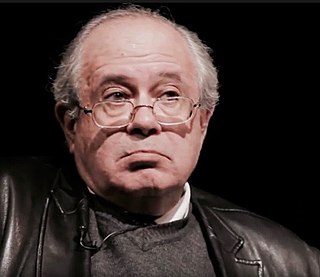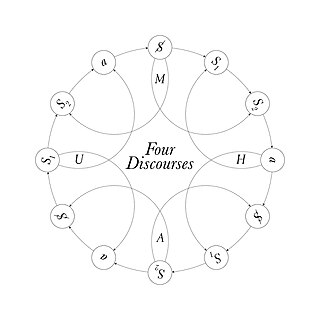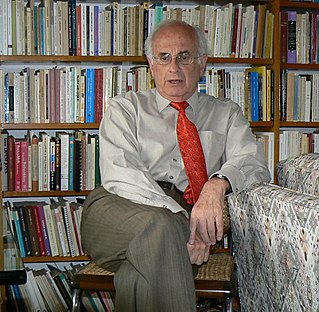The following outline is provided as an overview of and topical guide to critical theory:

Jacques Marie Émile Lacan was a French psychoanalyst and psychiatrist. Described as "the most controversial psycho-analyst since Freud", Lacan gave yearly seminars in Paris, from 1953 to 1981, and published papers that were later collected in the book Écrits. His work made a significant impact on continental philosophy and cultural theory in areas such as post-structuralism, critical theory, feminist theory and film theory, as well as on the practice of psychoanalysis itself.
Psychoanalytic literary criticism is literary criticism or literary theory that, in method, concept, or form, is influenced by the tradition of psychoanalysis begun by Sigmund Freud.
Psychoanalytic film theory is a school of academic thought that evokes the concepts of psychoanalysts Sigmund Freud and Jacques Lacan. The theory is closely tied to Critical theory, Marxist film theory, and Apparatus theory. The theory is separated into two waves. The first wave occurred in the 1960s and 70s. The second wave became popular in the 1980s and 90s.
Écriture féminine, or "women's writing", is a term coined by French feminist and literary theorist Hélène Cixous in her 1975 essay "The Laugh of the Medusa". Cixous aimed to establish a genre of literary writing that deviates from traditional masculine styles of writing, one which examines the relationship between the cultural and psychological inscription of the female body and female difference in language and text. This strand of feminist literary theory originated in France in the early 1970s through the works of Cixous and other theorists including Luce Irigaray, Chantal Chawaf, Catherine Clément and Julia Kristeva, and has subsequently been expanded upon by writers such as psychoanalytic theorist Bracha Ettinger. who emerged in this field in the early 1990s,

Jacques-Alain Miller is a psychoanalyst and writer. He is one of the founder members of the École de la Cause freudienne and the World Association of Psychoanalysis which he presided from 1992 to 2002. He is the sole editor of the books of The Seminars of Jacques Lacan.
Identification refers to the automatic, subconscious psychological process in which an individual becomes like or closely associates themselves with another person by adopting one or more of the others' perceived personality traits, physical attributes, or some other aspect of their identity. The concept of identification was founded by psychoanalyst Sigmund Freud in the 1920’s, and has since been expanded on and applied in psychology, social studies, media studies, and literary and film criticism. In literature, identification most often refers to the audience identifying with a fictional character, however it can also be employed as a narrative device whereby one character identifies with another character within the text itself.
In continental philosophy, the Real refers to the remainder of reality that cannot be expressed, and which surpasses reasoning. In Lacanianism, it is an "impossible" category because of its opposition to expression and inconceivability. The Real Order is a topological ring (lalangue) and ex-ists as an infinite homonym.
[T]he real in itself is meaningless: it has no truth for human existence. In Lacan's terms, it is speech that "introduces the dimension of truth into the real."

Four discourses is a concept developed by French psychoanalyst Jacques Lacan. He argued that there were four fundamental types of discourse. He defined four discourses, which he called Master, University, Hysteric and Analyst, and suggested that these relate dynamically to one another.
Sinthome is a concept introduced by Jacques Lacan in his seminar Le sinthome (1975–76). It redefines the psychoanalytic symptom in terms of the role of the subject outside of analysis, where enjoyment is made possible through creative identification with the symptom.

The Four Fundamental Concepts of Psychoanalysis is the 1978 English-language translation of a seminar held by Jacques Lacan. The original was published in Paris by Le Seuil in 1973. The Seminar was held at the École Normale Supérieure in Paris between January and June 1964 and is the eleventh in the series of The Seminar of Jacques Lacan. The text was published by Jacques-Alain Miller.

Néstor Alberto Braunstein was an Argentine-Mexican physician, psychiatrist and psychoanalyst.
Interpassivity is a term from media studies that refers to the phenomenon whereby a piece of art or technology seems to act on the audience or user's behalf; it is the opposite of interactivity. The meaning of the term was interpreted mainly by Robert Pfaller in 1996, and was quickly taken up by Slavoj Žižek.
The name of the father is a concept that Jacques Lacan developed from his seminar The Psychoses (1955–1956) to cover the role of the father in the Symbolic Order.
Lacanianism or Lacanian psychoanalysis is a theoretical system that explains the mind, behaviour, and culture through a structuralist and post-structuralist extension of classical psychoanalysis, initiated by the work of Jacques Lacan from the 1950s to the 1980s. Lacanian perspectives contend that the world of language, the Symbolic, structures the human mind, and stress the importance of desire, which is conceived of as perpetual and impossible to satisfy. Contemporary Lacanianism is characterised by a broad range of thought and extensive debate between Lacanians.

The Parallax View (2006) is a book by Slovenian philosopher Slavoj Žižek. Like many of Žižek's books, it covers a wide range of topics, including philosophy, psychoanalysis, neuroscience, politics, literature, and film. Some of the authors discussed in detail include Jacques Lacan, Georg Wilhelm Friedrich Hegel, Karl Marx, Immanuel Kant, Martin Heidegger, Alain Badiou, Michael Hardt and Antonio Negri, Daniel Dennett, Antonio Damasio, Franz Kafka, and Henry James.
Lorenzo Chiesa is a philosopher, critical theorist, translator, and professor whose academic research and works focus on the intersection between ontology, psychoanalysis, and political theory.
Bruce Fink is an American Lacanian psychoanalyst and a major translator of Jacques Lacan. He is the author of numerous books on Lacan and Lacanian psychoanalysis, prominent among which are Lacan to the Letter: Reading Écrits Closely, The Lacanian Subject: Between Language and Jouissance (1995), Lacan on Love: An Exploration of Lacan's Seminar VIII and A Clinical Introduction to Lacanian Psychoanalysis: Theory and Technique.

Duane Rousselle is a Canadian sociological theorist, Lacanian psychoanalyst, and Professor of Sociology. He works in several academic fields including Social Movement Studies, Lacanian Psychoanalysis, Cultural Sociology, Gender and Sexuality Studies, Anarchist Studies, and Continental Philosophy. His work attempts to introduce an alternative to scholarly discourses that aim to produce consistent and coherent bodies of knowledge. It also offers a counterpoint to what Jacques Lacan has called "capitalist discourse."
Jennifer Friedlander is an American cultural studies scholar.







